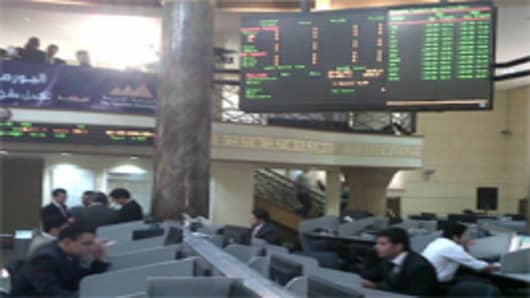The Egyptian pound is trading at the lowest levels against the U.S. dollar in more than seven and a half years, with experts telling CNBC further downside can be expected in the coming months.
Egypt's new president rejected the possibility of devaluation last week, leaving plenty of room for speculation as to where the local currency is headed.
Mohamed Mursi also said he would not impose new taxes and that his government would instead look at ways to stimulate investment and tourism.
His statement got additional support from reports on Tuesday that the U.S. government was close to agreeing on a $1 billion debt relief for Egypt.
The country is still muddling through its post-revolution transition and it would be the beginning of self-fulfilling prophecy if officials were to admit any plans to allow the Egyptian pound to depreciate.
CNBC reported earlier this year on the significant devaluation pressures the currency was facing.
Foreign currency reserves have dwindled, with the Central Bank citing a figure of $15.127 billion for the month of August, a 58 percent drop from the $36 billion before the unrest.
The numbers have been oscillating heavily in recent months, with a fall to $14.42 billion in July from $15.53 billion in June.
Since the fall of Hosni Mubarak in February of 2011, the Central Bank is widely believed to have been using a substantial amount of its reserves to defend the Egyptian pound.
The reality is that many of the key economic indicators that normally underpin currency strength in the Arab World’s most populous country, including economic growth driven by tourism and foreign direct investment, have yet to fully recover.
Officials are also struggling with high borrowing costs, with average yields at just over 15.7 percent.
These costs are not conducive when financing a budget deficit that may exceed eight percent of gross domestic product.
Nonetheless, strides described as essential have been made as of late, such as assurances and direct deposits from petrodollar giants Saudi Arabia and Qatar.
"We made a call, starting March 2012, that we are unlikely to see a disorderly devaluation of the Egyptian Pound thanks to several domestic and external considerations, namely external support from the Gulf Cooperation Council (GCC)," Florence Eid, CEO and Founder of Arabia Monitor, told CNBC.
The weakening of the local currency has been remarkably smooth: On December 1 2010, just before the outbreak of the uprising, the Egyptian Pound was trading at 5.7695 against the U.S. dollar.
As of Thursday, the Egyptian pound changed hands for 6.091, a decline of 5.8 percent in close to 23 months. It amounts to just 1.2 percent so far this year.
Experts have told CNBC that the "gradual depreciation" tactic has helped keep investor anxiety about lending to the government in foreign currency somewhat in check.
And that is likely to continue until the deal with the International Monetary Fund (IMF) is concluded.
A formal request for a $4.8 billion loan is out, and an agreement is expectedbefore the end of year.
Where then does the EGP go from here? "Based on reduced potential FX weakness and spread widening, the Egyptian pound looks attractive, with implied yields of 25 percent for 1-Year FX forwards outright.
This also looks interesting vs. 1-Year Egypt Credit Default Swaps (CDS) at 2.25 percent for downside protection if pressure reignites," Eid added.
In a meeting on Thursday, the Monetary Policy Committee (MPC) of Egypt’s Central Bank kept benchmark overnight deposit and lending rates unchanged. No moves were expected as authorities attempt to balance tepid economic growth and exchange rate stability.
The relative ambiguity on the currency front seems not to have taken the luster from other asset classes.
Egypt’s stock exchange, the EGX30, is among the world’s best performing stock indices having gained more than 50 percent so far this year, second only to Venezuela.
Yousef Gamal El-Din is CNBC's Middle East Correspondent and contributes to the channel’s flagship shows, as well as analysis for CNBC.com.
Stay in touch with him on Twitter at http://www.twitter.com/youseftv @youseftv


